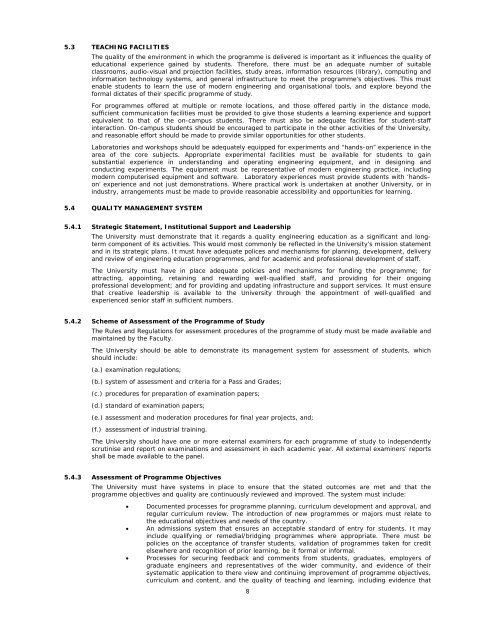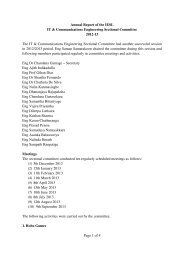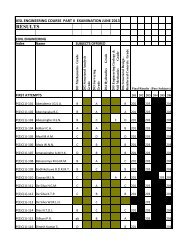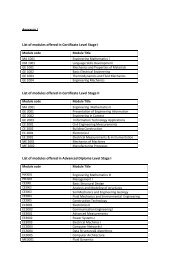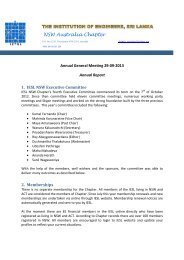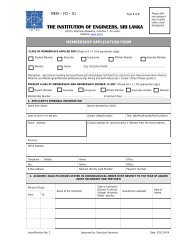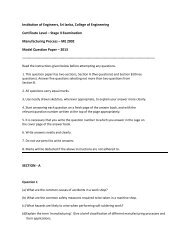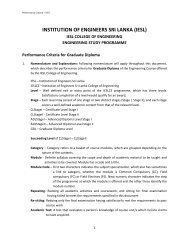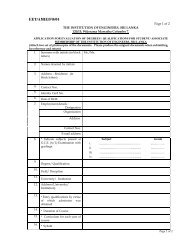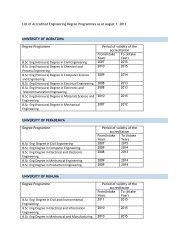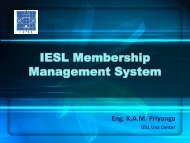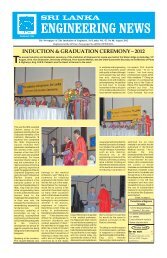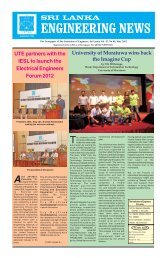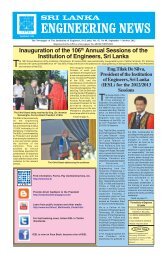1 - The Institution of Engineers Sri Lanka
1 - The Institution of Engineers Sri Lanka
1 - The Institution of Engineers Sri Lanka
Create successful ePaper yourself
Turn your PDF publications into a flip-book with our unique Google optimized e-Paper software.
5.3 TEACHING FACILITIES<strong>The</strong> quality <strong>of</strong> the environment in which the programme is delivered is important as it influences the quality <strong>of</strong>educational experience gained by students. <strong>The</strong>refore, there must be an adequate number <strong>of</strong> suitableclassrooms, audio-visual and projection facilities, study areas, information resources (library), computing andinformation technology systems, and general infrastructure to meet the programme’s objectives. This mustenable students to learn the use <strong>of</strong> modern engineering and organisational tools, and explore beyond theformal dictates <strong>of</strong> their specific programme <strong>of</strong> study.For programmes <strong>of</strong>fered at multiple or remote locations, and those <strong>of</strong>fered partly in the distance mode,sufficient communication facilities must be provided to give those students a learning experience and supportequivalent to that <strong>of</strong> the on-campus students. <strong>The</strong>re must also be adequate facilities for student-staffinteraction. On-campus students should be encouraged to participate in the other activities <strong>of</strong> the University,and reasonable effort should be made to provide similar opportunities for other students.Laboratories and workshops should be adequately equipped for experiments and “hands-on” experience in thearea <strong>of</strong> the core subjects. Appropriate experimental facilities must be available for students to gainsubstantial experience in understanding and operating engineering equipment, and in designing andconducting experiments. <strong>The</strong> equipment must be representative <strong>of</strong> modern engineering practice, includingmodern computerised equipment and s<strong>of</strong>tware. Laboratory experiences must provide students with ‘hands–on’ experience and not just demonstrations. Where practical work is undertaken at another University, or inindustry, arrangements must be made to provide reasonable accessibility and opportunities for learning.5.4 QUALITY MANAGEMENT SYSTEM5.4.1 Strategic Statement, <strong>Institution</strong>al Support and Leadership<strong>The</strong> University must demonstrate that it regards a quality engineering education as a significant and longtermcomponent <strong>of</strong> its activities. This would most commonly be reflected in the University’s mission statementand in its strategic plans. It must have adequate polices and mechanisms for planning, development, deliveryand review <strong>of</strong> engineering education programmes, and for academic and pr<strong>of</strong>essional development <strong>of</strong> staff.<strong>The</strong> University must have in place adequate policies and mechanisms for funding the programme; forattracting, appointing, retaining and rewarding well-qualified staff, and providing for their ongoingpr<strong>of</strong>essional development; and for providing and updating infrastructure and support services. It must ensurethat creative leadership is available to the University through the appointment <strong>of</strong> well-qualified andexperienced senior staff in sufficient numbers.5.4.2 Scheme <strong>of</strong> Assessment <strong>of</strong> the Programme <strong>of</strong> Study<strong>The</strong> Rules and Regulations for assessment procedures <strong>of</strong> the programme <strong>of</strong> study must be made available andmaintained by the Faculty.<strong>The</strong> University should be able to demonstrate its management system for assessment <strong>of</strong> students, whichshould include:(a.) examination regulations;(b.) system <strong>of</strong> assessment and criteria for a Pass and Grades;(c.) procedures for preparation <strong>of</strong> examination papers;(d.) standard <strong>of</strong> examination papers;(e.) assessment and moderation procedures for final year projects, and;(f.) assessment <strong>of</strong> industrial training.<strong>The</strong> University should have one or more external examiners for each programme <strong>of</strong> study to independentlyscrutinise and report on examinations and assessment in each academic year. All external examiners’ reportsshall be made available to the panel.5.4.3 Assessment <strong>of</strong> Programme Objectives<strong>The</strong> University must have systems in place to ensure that the stated outcomes are met and that theprogramme objectives and quality are continuously reviewed and improved. <strong>The</strong> system must include:• Documented processes for programme planning, curriculum development and approval, andregular curriculum review. <strong>The</strong> introduction <strong>of</strong> new programmes or majors must relate tothe educational objectives and needs <strong>of</strong> the country.• An admissions system that ensures an acceptable standard <strong>of</strong> entry for students. It mayinclude qualifying or remedial/bridging programmes where appropriate. <strong>The</strong>re must bepolicies on the acceptance <strong>of</strong> transfer students, validation <strong>of</strong> programmes taken for creditelsewhere and recognition <strong>of</strong> prior learning, be it formal or informal.• Processes for securing feedback and comments from students, graduates, employers <strong>of</strong>graduate engineers and representatives <strong>of</strong> the wider community, and evidence <strong>of</strong> theirsystematic application to there view and continuing improvement <strong>of</strong> programme objectives,curriculum and content, and the quality <strong>of</strong> teaching and learning, including evidence that8


